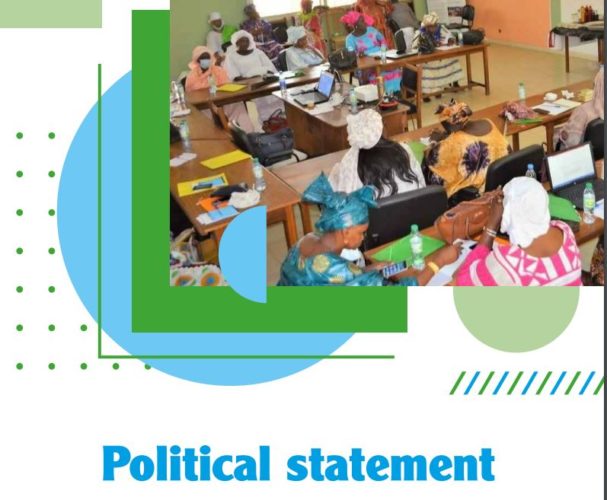Rural women in Senegal have commited to take action to address hunger in their communities. On Oct. 15 and 15, the International Day of Rural Women & World Food Day, respectively, women from the two organizations representing farmers in Senegal and West Africa, respectively met to discuss the current crisis. The Conseil National de Concertation et de Coopération des Ruraux (CNCR) and ROPPA (Réseau des organisations paysannes et de producteurs de l’Afrique de l’Ouest) released two statements following these meetings.
The first begins:
Statement of rural women within CNCR and ROPPA
Let’s strengthen our commitment and mobilization to make the ongoing systemic crisis a factor for accelerating the recognition and empowerment of women within family farms, farmer organizations (FOs) and rural communities.
Everyone knows today the marginal place granted to women and their activities in social and economic hierarchies … and yet everyone knows the importance of their roles in the balance of our families, farms and our local communities, but also the importance of their contribution to the economy of our country … rural women are doubly victimized by the world order and affairs. Everything must be done in West Africa as elsewhere so that this changes and that rural and farmer women find a fair recognition for themselves, for their roles and activities.
Policy-makers, farmer organizations and civil society are all responsible for changing this situation and transcending the fundamental factors of the vulnerability of rural women and the inequalities that impede their triple recognition and empowerment. According to a capitalization carried out by a consortium of FOs and CSO networks in West Africa under the leadership of Oxfam, because of the recurring factors of their vulnerability and the inequalities observed, the COVID-19 pandemic has an impact that is even higher among rural women.
In this contact, we are fully convinced that it is first and foremost up to ourselves to conquer and impose the diresed triple recognition and, to do this, we must be able to organize ourselves as a “collective actor” thanks to the strengthening of our local, national and regional organizations. Beyond our own activities, our organizations must allow us to participate in life of the great West African farmer movement and depend our positions, proposals and specific requests.
Read more from this Statement of rural women within CNCR and ROPPA.
The second statement, addressing the hunger crisis, begins:
Political Statement: To make the prospect of “zero hunger in 2030” possible, let’s act together, more and better, in order to implement structural and political solutions.
For farmer memory, never in life, never in the history of our region, have we experienced such a serious and massive crisis. We need structural solutions.
It is in a particular context that we as farmer organizations, pastoralists, agri-pastoralists and fishermen, this year mark the Word Food Day during which, we express to our interlocutors and partners our thoughts, visions, and wishes, likely to strengthen their initiatives for a sustainable transformation of our family farmers, for the good of our countries and our region.
In addition to the multiple recurring crises facing our communities, this year we have seen a worsening security crisis, which has forced many farmers, pastoralists, agri-pastoralists and fishermen in Sahelian areas in particular to leave their villages, abandoning their property, productive capital and take a path of exile. A new curse, the health crisis related to the coronavirus has hit hard the agricultural and food economies of our countries. Farmers of our countries, who live only on their productions and the sale of part of the fruits of their work, have found themselves in a situation of asphyxiation. A difficult year so for the world’s farmers pastoralists, agri-pastoralists and fishermen across West Africa. We have certainly found a little comfort in listening often attentively to our national, regional and international public or private partners, but it is clear that this listening has not improved our place in the game of actors, often economically powerful, which gives its physiognomy and dynamics to the global agricultural and food system in which we occupy a bad folding seat.
Read more from this political statement about making “zero hunger in 2030” possible.


Permalink
I really like it when folks come together and share opinions. Great site, stick with it. Sal Hartley Hazlett
Permalink
Im obliged for the blog post. Much thanks again. Great. Cherilynn Homerus Domph